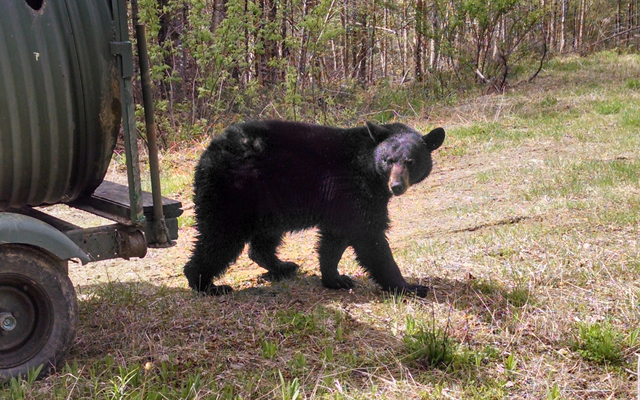
Madawaska Police Chief Ross Dubois and his officers deal with a variety of issues, from traffic stops to domestic violence. But people also call his office with animal complaints, and Dubois said nuisance bears have been the source of an unusually high number this spring.
“We’ve had a huge amount of bear complaints this year,” Dubois said last week.
“People are wanting to fire a gun in the air to scare them away. We don’t recommend that,” the chief said. “Those bullets do come back down eventually.”

An adult female black bear rests in a culvert trap during transport from Orono to a remote location in southern Aroostook County on Monday, June 23, 2014. The bear was one of several that have been raiding bird feeders and prompting complaints from residents in Orono. (Photo courtesy of Maine Warden Service)
Dubois’ department covers large wooded areas around Long Lake and the back settlements of Madawaska and St. David, both prime habitat for black bears. The Maine Warden Service is the agency tasked with dealing with nuisance bears and other wildlife complaints, and local police most often contact a warden when there are issues.
In Maine, black bears are found nearly statewide, but are most common in northern and eastern Maine and are rarely found in the heavily settled southern and central-coastal regions.
Bioloigists estimate there are 36,000 black bear statewide. In 2015, the last year for which data is available, hunters harvested a little more than 3,000 bear in Maine, which has been the typical number harvested each of the last several years.
While they are generally shy, a bear’s need for food is its prime motivation.
“They need to eat a year’s worth of food in a couple of months,” said Sgt. Durward Humphrey of the Maine Warden Service.
Humphrey, who works out of the department’s Ashland office, said wardens in the area deal with numerous calls each year about bears being near homes.
The total number of nuisance bear complaints in the region this year is not significantly higher than normal, Humphrey said, although he did not have specific data in hand. He did add that calls are coming from some new locations, such as St. David.
“Caribou and Presque Isle are usually our hot spots,” for bear complaints, Humphrey said.
Dubois believes there likely are more bear and homeowner encounters that are not reported to either local police or wardens.
Humphrey said the bear’s drive to eat leads it to easy sources of food.
“They are driven 99.9 percent by what they smell,” he said.
Things such as backyard grills, pet food left outside, bird feeders and trash filled with food waste all will attract bears into a person’s yard or the garage. Bears have been known to break into garages to get to smelly trash.
To prevent any unwanted encounters or conflicts, the state’s Department of Inland Fisheries and Wildlife recommends people clean their grills and keep them free of excessive grease, wash out and bleach garbage cans, take down bird feeders between April 1 and Nov. 1, and refrain from keeping bowls of pet food outside.
“Eliminating food source and smells help,” he said.
Bear hunting with bait begins Aug. 28 and continues through most of September. Bait can be placed at hunting sights starting July 29, and Dubois thinks this could help draw hungry bears away from residential areas where they have been going in search of food.
The weight of Maine black bears can vary tremendously depending on the season, according to Maine Fish and Wildlife biologists. Adult males average 250-600 pounds and are heaviest in late fall when they’ve stored up the most body fat to hibernate for the winter. Females are smaller, weighing 100-400 pounds.
Because of their size, power and claws, even a non aggressive bear may unintentionally harm a person or pet if they get too close.
As for firing a gun to scare away a bear, Humphrey said the practice is rarely effective, not to mention unsafe and likely against the law in many areas near homes.
“For a bear that is just passing through, it may scare them away,” Humphrey said. “But for one that has been hanging around a while, it won’t work.”
Wardens and biologists will live trap a bear, and move it to a more remote location, if it poses a serious risk to public safety. However, Humphrey said another bear eventually will come to the area to take its place.
As for the possibility of encountering a rabid bear, Humphrey said it is a very rare thing.
“I’ve been doing this for 24 years and I’ve never seen one,” he said.







